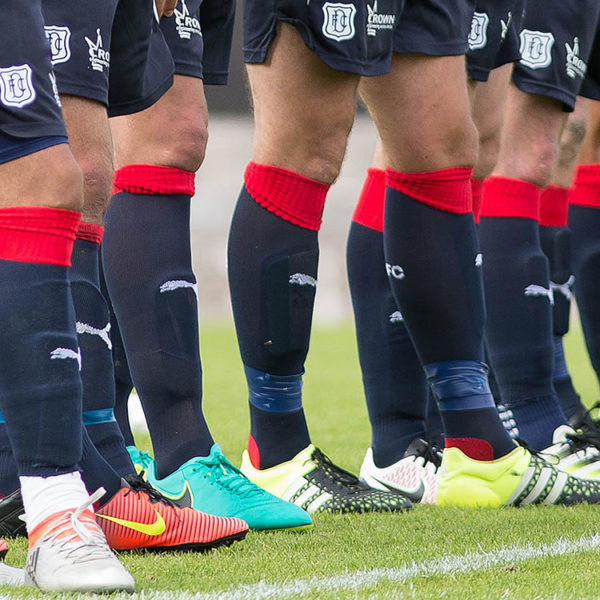Scotland take on Denmark at Hampden tonight and the first Scotland player to score against Denmark was Dundee’s Billy Steel in May 1951.
Billy Steel was one of Scotland’s greatest inside forwards who combined a brilliant footballing brain with a busy work ethic and an explosive shot. He was a genius, a maverick, an individual, a joker, the superstar of his day and was arguably the best player ever to play for Dundee Football Club. Signed for a world record fee that was unsurpassed by a Scottish club for over a decade, he brought with him a national interest in Dundee that had been previously unheard of and brought glory to Dens as the Dark Blues won their first silverware for over four decades just over twelve months after he arrived.
Born in the Stirlingshire village of Denny on May 1st 1923, Billy Steel started his professional career with Leicester City when they nipped in, in front of a host of clubs, to sign the sixteen-year-old but his spell at Filbert Street was short lived when the manager was sacked and no one remembered to renew the young Scot’s contract.
After a short spell at Love Street as an amateur, Billy joined St Mirren’s Renfrewshire neighbours Morton but his stint in Greenock was soon interrupted by the Second World War during which he turned out for the British Army on the Rhine. Re-establishing footballing connections with other teams on the Continent, the team visited France, Holland, Poland, Switzerland, the Channel Islands and Germany, and Steel played alongside such notables as Leslie Compton, Eddie Hapgood and Matt Busby before being demobbed in December 1946, when he returned to Morton.
In 1947, Billy enhanced his growing reputation when he was selected to play for Great Britain against The Rest of Europe at Hampden Park in Glasgow and he turned in a star performance, scoring Britain’s third goal in a 6-1 win. His place as one of the game’s rising stars was now assured and Billy decided to try his luck south of the border once more when Derby County were persuaded to part with a then British record £15,500 for his signature later that year.
By September 1950, ‘The Pocket Dynamo’ had developed into one of the first football superstars who, with seventeen Scottish caps in his locker, was determined to earn enough money from the game to make him financially secure by the time he had retired from playing. His wife however was by then homesick and Billy moved back to Glasgow with her, only travelling down to Derby on match days, but it was an arrangement that was never going to work. As he started to attract interest from clubs north of the border, Billy took the unprecedented step of calling his own press conference to announce that he would be leaving Derby and it looked odds on that he would be going to boyhood heroes Rangers when he started using training facilities at Ibrox.
What the press didn’t know however was that Dundee manager George Anderson had been secretly working on a deal to bring him to Dens and once Billy met the flamboyant Dark Blues boss, he was convinced that Dens Park was the place for him. Steel remembered an act of kindness Anderson had once shown him during the war, when he had organised some food and drink for the train journey home after playing in a five-a-side competition in the Granite City and so was happy to shake hands on a move with the bowler-hatted gentleman.
The genial Aberdonian was a highly persuasive character and on September 21st 1950, Dundee F.C. called a press conference where a beaming Anderson stunned the assembled media by declaring: “Gentlemen, I want to introduce you to Billy Steel, ex-Derby County and now of Dundee!” The country was shocked as the club had paid a world record fee of £23,500 for one of the best known players in British football and it was one of the transfer coups of the century.
Two days later, 34,000 fans, around 8,000 more than normal, turned out for Steel’s debut against Aberdeen and while the flaxen-haired forward clearly lacked match practice, his clever positioning and masterly touches were an inspiration. With only nineteen minutes remaining, Steel became an instant hero to his new adoring public when he scored Dundee’s opener with a low shot and the extinct volcano known as The Law which overlooks the ground almost erupted with the noise.
‘Midget Gem’ had been an automatic choice for Scotland since 1947 and further caps against Wales and Northern Ireland that autumn made Billy Dundee’s first full internationalist since Colin McNab’s Wembley appearance against England in April 1932.
The stocky inside-forward brought power and imagination to the Dundee front-line and by mid-November, they led the Scottish League ‘A’ Division with only one defeat in ten matches. Dundee continued their challenge for the league title and eventually finished third in April but the real glory was to come six months later and Billy was at the very heart of it.
‘Budgem’ as his team mates nicknamed him had outstanding ability which gave him a confidence which was often seen as arrogance and wasn’t welcomed by his fellow players. He had a sharp tongue, which his team mates often found themselves on the wrong end of during the ninety minutes, but the impact he made on the park brought them the success that had slipped from their grasp in previous years.
The first of those successes came in October 1951 when Dundee beat Rangers 3-2 to lift the Scottish League Cup with Billy setting up skipper Alfie Boyd for the winner. Steel was a genius and he knew it and when Dundee won a free kick with only seconds remaining, after Rangers had just drawn level, Billy told Boyd to get in the box, saying to him, “I’ll place it on your head Alfie,” and he did just that as Boyd leapt high to head home from eight yards out from Billy’s high centre.
By the end of the season, Steel had scored six goals on a second ‘Road to Hampden’ but this time Dundee lost out 4-0 to Motherwell in the Scottish Cup Final. Six months later however, they were back on the Hampden trail and became the first side to retain the League Cup when Kilmarnock were put to the sword 2-0, with Billy scoring another six en route to the final.
Steel earned three League caps and 13 full caps during his time at Dens and in one of those appearances became the first Scotland player to be sent off in May 1951. Billy took umbrage at the treatment dished out to his good friend George Young of Rangers and sought retribution against one of the offending Austrians in a match which became known as the ‘Battle of Vienna’.
In the match against Denmark on Saturday 12th May 1951, the Danes took the lead but Billy Steel equalised for Scotland on 33 minutes. There had been an unofficial match against Denmark in 1932 for which no caps were awarded and not recognised by the SFA so Steel’s goal was the first official Scotland goal against the Danes.
Billy’s goal was his 12th and final goal for Scotland in an international career which would win him 30 caps, 13 of which were as a Dundee player. He scored five goals for Scotland as a Dundee player, four of which came in his second international as a Dee when he scored a double brace in a 6-1 win over Northern Ireland at Hampden, two months after he joined up at Dens Park.
His time at Dens lasted four glorious years and his departure from Dundee was in typical Steel fashion when he called another press conference and shocked Scottish football by announcing he was emigrating to the United States. Steel saw out the rest of his days in America where he managed the Los Angeles Danes before taking a job in advertising after retiring and where he sadly died aged just 59 in May 1982.
Billy Steel, ‘Mr. Perpetual Motion’ will never be forgotten at Dens Park where a hospitality lounge and supporters club bear his name and in May 2009, he was inducted into the inaugural Dundee F.C. Hall of Fame, having already been inducted into the S.F.A Hall of Fame three years before.
Steel was a hard little man with bounding vitality who as a perfectionist often did not suffer the short comings of less gifted colleagues, but he was adored on the Dens Park terracing and prior to Claudio Caniggia joining the club fifty years later, no Dundee signing had captured the public imagination and national headlines quite like Billy Steel’s record-breaking move to Dens.
Honours at Dundee:
Scottish League Cup winners: 1951/52, 1952/53
Scottish Cup runners-up: 1952
Scotland full caps: 13
Scottish League caps: 3
Dundee F.C. Hall of Fame: 2009 Legends Award
Appearances, Goals:
League: 94, 27 goals
Scottish Cup: 13, 7 goals
League Cup: 24, 11 goals
Totals: 131, 45 goals
















